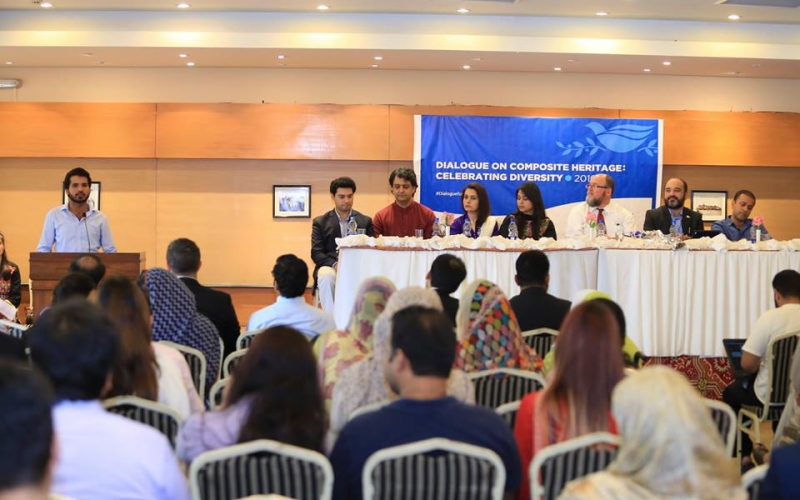By Rimsha Ali Shah
The audience at Foundation for Arts, Culture, and Education (FACE) was deeply engulfed in the intricate synthesis of instrumentation and captivating vocals of Shahram Azhar performing the enchanting poetry of revered Sufi mystic, Lal Shahbaz Qalandar.
The classical ensemble featuring the rubab, tabla and harmonium anatomized the connection between Sufism and humanity through music. This “Sufi Night” marked the end of “Promoting Peace through Composite Heritage,” a project by Global Undergraduate Exchange Program (UGRAD) alumnus Raj Kumar.
This was made possible with the help of an alumni small grant from the Pakistan-U.S. Alumni Network (PUAN). All alumni of various U.S. government-sponsored exchange programs in Pakistan are eligible to apply for the grant of up to 5,000 USD to enable them to give back to their communities. The project was also part of Days of Interreligious Youth Action (DIYA) – a project of the U.S. Secretary of State’s Office of Religion and Global Affairs, facilitated in cooperation with the Alumni Affairs Office of the Bureau of Education and Cultural Affairs. DIYA is a pilot program that seeks to highlight these youth-led civic initiatives and broaden their impacts.
Over the past two months, the project engaged youth, social activists, authors and civil society members in a set of events designed to foster harmony among religious minorities through art, sports, dialogue, and music. Read on to learn more about the last two events under this project: a dialogue on composite heritage and Sufi night.
Dialogue on Composite Heritage Celebrates the Power of Cultural Appreciation
“Diversity needs to be appreciated – not tolerated,” Irum Zahra, author and founder of Beyond Sanity Publishing.

Panelists from diverse background discuss composite heritage
Irum was speaking as part of the panel discussion on cultural diversity at Islamabad Club on August 09, 2016. The event explored the power of dialogue for peace promotion. The panel comprised of civil society activists, youth leaders, artists and writers, each presenting their unique perspective on the role of diversity and composite heritage as a viable tool for peace promotion to an audience of 100 young leaders.
Nasreen Aziz, an alumna of the International Visitors Leadership Program (IVLP) on Disability Leadership, had traveled from Azad Jammu and Kashmir to attend the dialogue. “I found this topic quite unique and I wanted to learn more about composite heritage for peace promotion. I believe a collaborative approach towards peace will surely bear positive results.”

Mubashir Akram, CEO, Shao’or Foundation recounts his experience of visiting Lok Virsa
The discussion delved into the role of heritage, history, culture, art and religion under the umbrella of diversity. Mubashir Akram, CEO, Shao’or Foundation recounted his experience of visiting the Lok Virsa Museum to learn about the cultural history of the region. “The sub-continent with 7500 years of history has been a land where all religions were accepted and celebrated.”
Ehtesham Ravi from the Christian Center stressed on taking the message discussed here to the masses. “Composite heritage and its acceptance should be a part of everyday discussion.” Raania Najmi representing the Baha’i community believed that in order to overcome the darkness of ignorance, people of all faiths needed to accept the differences. “This diversity is what makes our world colorful,” she added.
Jeffrey Hill, Director, Community Engagement Office, Public Affairs Section, U.S. Embassy, Islamabad how his journey as a diplomat had exposed him to different cultures.
“Loving and celebrating diversity is what makes us stronger. The presence of violence underscores the need for active cultural diplomacy.”
Sufi Night Explores Humanist Connection through Music
The Sufi Night brought 30 individuals from diverse cultural and religious backgrounds together to bond through music and poetry. This event was held on August 26, 2016, at FACE.
Kapil Dev, an IVLP alumnus and human rights activist, said, “Poetry of Sufi and progressive poets and music can play an instrumental role in countering growing extremism and terrorism that the country is currently confronting with.”

Sufi Night: Shahram Azhar enthralls audience at FACE
Shahram Azhar, the founder, and ex-vocalist of Laal Band and a Fulbright Scholar flew in especially from Karachi for the performance. “Sufi music is governed by the principles of ‘absorption’ and ’empathy’; ‘music’ is merely the process or tool via which that transcendence is achieved. If you pay a little attention you will realize that these two principles are ‘universalist’ values and that is precisely what we need to build a more peaceful and harmonious society: universalism.”
Qawwalistan diversified the musical flavor of the evening with a mixture of classical and modern instruments with their rock-fusion Qawwali style. Ameena Daud found their performance truly mesmerizing. “Sufi Music has such a magical grip of you – the poetry and rhythm evade all boundaries and truly unites us as humans.”
Peer Mudassir, an IVLP alumnus and CEO of Salook Foundation, said, “The simplicity behind the idea of this project moved me to engage and learn more about the concept of composite heritage as a peace promoter.”
For Raj Kumar, the results of the project in the form of 250 direct beneficiaries including children, youth and civil society leaders from four different faiths – Islam, Hinduism, Christianity, and Baha’i – was the objective he had set out to achieve. “Our shared values helped us connect with our history and our roots, paving the way for inculcating acceptance and tolerance as a way of life. I am hopeful that each of our 250 beneficiaries will play their part in promoting interfaith harmony in their circles.”
To learn more about the first two activities under DIYA – Promoting Peace through Composite Heritage, visit:
Interfaith Sports Gala Builds Sportsmanship Among Youth
Forging Bonds of Harmony through Art

